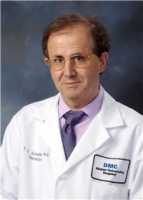16 Aug Absorbable Scaffold May Replace Metal Stents For Some Coronary Artery Procedures
MedicalResearch.com Interview with:
Dr. Theodore L. Schreiber MD
President of the Detroit Medical Center Heart Hospital and DMC Cardiovascular Institute.
Doctor Schreiber is involved in ongoing research in carotid artery stenting, has been the principal or co-principal investigator on numerous cardiovascular research studies and has written dozens of book chapters, articles and abstracts on interventional cardiology.
Abbott announced July 5, 2016 that the U.S. Food and Drug Administration has approved the company’s Absorb bioresorbable heart stent,
MedicalResearch.com: What is the background for this stent? What are the main advantages?
Response: The Absorb™ bioresorbable vascular scaffold is an advance in the treatment of coronary artery disease, which affects 15 million people in the United States and remains a leading cause of death worldwide despite decades of therapeutic advances. For this reason, DMC Heart Hospital, which serves a population at high risk of cardiovascular disease, was among the first in the state of Michigan to adopt this new stent.
While stents are traditionally made of metal, the Absorb™ stent is made of a naturally dissolving material, similar to dissolving sutures. Absorb™ disappears (except for two pairs of tiny metallic markers that remain in the artery to enable a physician to see where the device was placed) in about three years, after it has done its job of keeping a clogged artery open and promoting healing of the treated artery segment. By contrast, metal stents are permanent implants.
MedicalResearch.com: Are there differences in the surgical process, recovery or complications from traditional stents?
Response: As with most new medical devices, our physicians and clinical teams had to undergo extensive training prior to our first Absorb™ stent implantation, to understand its individual risk factors, potential complications and impact on recovery.
MedicalResearch.com: What should readers take away from your report?
Response: The benefit of a bioresorbable stent comes from not implanting a permanent metal prosthesis. After it has dissolved, the patient’s artery is restored to a natural state. While this technology may not be practical for every patient, it allows us to provide more options for many people suffering from potentially life-threatening blockages.
MedicalResearch.com: Is there anything else you would like to add?
Response: Our goal at DMC Heart Hospital is to provide next-level care in every aspect – technically, clinically, and personally. This new technology is an excellent example of our ‘never settle for the status quo’ mindset.”
MedicalResearch.com: Thank you for your contribution to the MedicalResearch.com community.
Citation:
The Absorb™ bioresorbable vascular scaffold to treat patients with coronary artery disease
Note: Content is Not intended as medical advice. Please consult your health care provider regarding your specific medical condition and questions.
More Medical Research Interviews on MedicalResearch.com
[wysija_form id=”5″]
Last Updated on August 16, 2016 by Marie Benz MD FAAD

